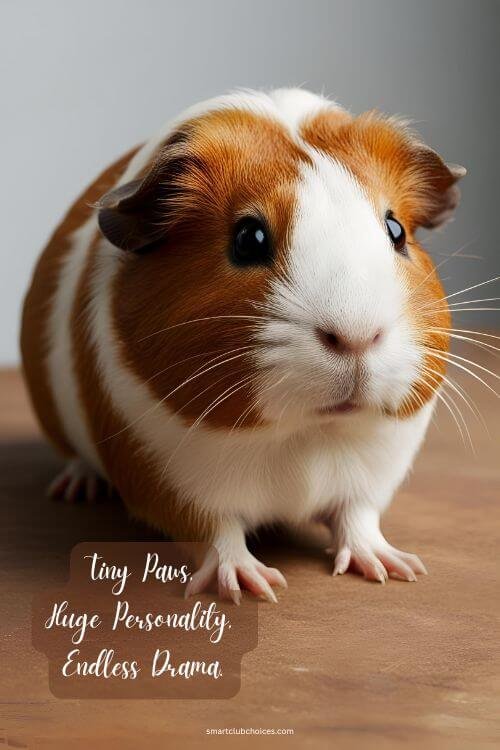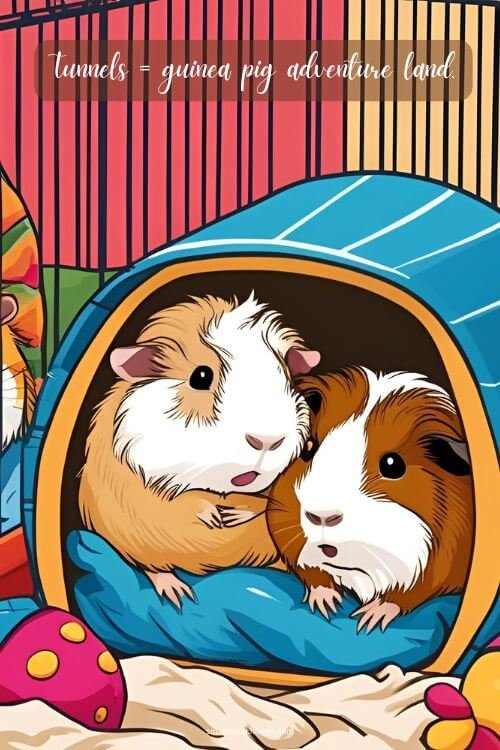Common Guinea Pig Health Problems and How to Prevent Them
Guinea pigs are like tiny, furry comedians—always ready to brighten your day with their wheeks and popcorns.
But just like any superstar, they need a little extra care to stay in top shape. Unfortunately, these little guys are prone to a few health issues that can turn their happy squeaks into worried squeals.
Don’t fret, though! In this blog, we’ll walk you through the most common guinea pig health problems and how to prevent them. Let’s keep those piggies healthy and happy!
Table of Contents
(1) Dental Problems—When Teeth Go Rogue
Guinea pigs have teeth that never stop growing. Sounds cool, right? Well, not so much when those teeth start causing trouble. Dental issues are one of the most common health problems in guinea pigs, and they can lead to pain, difficulty eating, and even weight loss.
What Causes Dental Problems?
- Malocclusion: This is a fancy word for misaligned teeth. When their teeth don’t wear down properly, they can grow too long and cause pain.
- Poor Diet: A lack of hay can lead to overgrown teeth since hay is essential for natural wear and tear.
How to Prevent It
- Unlimited Hay: Make sure your guinea pig has access to fresh hay 24/7. It’s like a toothbrush and dinner rolled into one.
- Regular Checkups: Take your guinea pig to the vet for routine dental checks. Catching problems early can save you (and your piggy) a lot of trouble.
Pro tip: If your guinea pig is drooling, dropping food, or losing weight, it’s time to call the vet.

(2) Respiratory Infections—The Sniffles of Doom
Guinea pigs are delicate creatures, and their respiratory systems are no exception. Respiratory infections can turn into serious problems if not treated promptly.
Symptoms to Watch For
- Sneezing
- Nasal discharge
- Labored breathing
- Lethargy
What Causes Respiratory Infections?
- Dirty Cages: Ammonia from urine can irritate their lungs.
- Drafts: Guinea pigs hate cold drafts almost as much as they hate empty food bowls.
- Stress: A stressed guinea pig is more susceptible to infections.
How to Prevent It
- Clean the Cage Regularly: Aim to clean the cage at least once a week. Spot clean daily to keep things fresh.
- Keep Them Warm: Avoid placing their cage near windows or air vents.
- Reduce Stress: Give them plenty of hiding spots and avoid sudden changes in their environment.
(3) Scurvy—The Vitamin C Crisis
Did you know guinea pigs can’t produce their own Vitamin C? That’s right—they’re like tiny pirates at risk of scurvy if they don’t get enough of this essential nutrient.
Symptoms of Scurvy
- Lethargy
- Swollen joints
- Poor coat condition
- Loss of appetite
What Causes Scurvy?
- Lack of Fresh Veggies: Guinea pigs need a daily dose of Vitamin C-rich foods.
- Old Pellets: Vitamin C degrades over time, so expired pellets won’t cut it.
How to Prevent It
- Feed Fresh Veggies: Bell peppers, kale, and broccoli are excellent sources of Vitamin C.
- High-Quality Pellets: Choose pellets fortified with Vitamin C and check the expiration date.
- Supplements: If your vet recommends it, you can give your guinea pig a Vitamin C supplement.
Fun fact: A guinea pig needs about 10-30 mg of Vitamin C per day. That’s roughly the amount in a small slice of bell pepper.
(4) Bladder Stones—The Painful Pebbles
Bladder stones are like tiny, painful rocks that can form in your guinea pig’s urinary tract. They’re uncomfortable, dangerous, and require immediate veterinary attention.
Symptoms of Bladder Stones
- Blood in urine
- Straining to urinate
- Lethargy
- Loss of appetite
What Causes Bladder Stones?
- High-Calcium Diet: Too much calcium can lead to stone formation.
- Dehydration: Not drinking enough water can concentrate minerals in the urine.
How to Prevent It
- Limit High-Calcium Foods: Avoid feeding too much alfalfa hay or calcium-rich veggies like spinach.
- Provide Fresh Water: Make sure your guinea pig always has access to clean water.
- Encourage Hydration: Offer watery veggies like cucumbers to keep them hydrated.
(5) Parasites—The Unwanted Guests
Nobody likes uninvited guests, especially when they’re creepy crawlies. Guinea pigs can suffer from external parasites like mites and lice, which can cause itching, hair loss, and skin irritation.
Symptoms of Parasites
- Excessive scratching
- Hair loss
- Scabs or redness on the skin
What Causes Parasites?
- Dirty Cages: Poor hygiene can attract parasites.
- Contact with Infected Animals: If your guinea pig hangs out with other pets, they might pick up unwanted hitchhikers.
How to Prevent It
- Keep the Cage Clean: Regular cleaning can help keep parasites at bay.
- Quarantine New Pets: If you introduce a new guinea pig, keep them separate for a few weeks to ensure they’re parasite-free.
- Regular Grooming: Brush your guinea pig regularly to check for signs of parasites.

(6) Conclusion: A Healthy Guinea Pig is a Happy Guinea Pig
Guinea pigs may be small, but they’ve got big personalities and even bigger health needs. By staying on top of their diet, hygiene, and environment, you can prevent most common health problems and keep your piggy in tip-top shape.
Remember, prevention is always better than cure. Regular vet checkups, a balanced diet, and a clean living space are the keys to a long, happy life for your guinea pig.
And if you ever notice something off—whether it’s a change in appetite, behavior, or appearance—don’t hesitate to call your vet.
Your guinea pig relies on you for everything, from their daily veggies to their cozy bed.
So, let’s give them the best care possible. After all, a healthy guinea pig is a happy guinea pig, and a happy guinea pig means more wheeks, more popcorns, and more adorable moments to cherish.
Now, go give your guinea pig a gentle head scratch (and maybe a slice of bell pepper) from me. Until next time, stay squeaky clean!








